14th Abu Dhabi International Chess Festival
The 14th Abu Dhabi Chess Festival 2003 is being held from Saturday, August
14th until Tuesday, August 24, 2004. The venue is the Cultural Foundation in
Abu Dhabi. The organizers are the Cultural Foundation & Abu Dhabi Chess
& Culture club with full technical and administrational supervision. The
PAL group of companies is staging a special eight-game computer match, pitting
two of the world's most powerful chess playing programs against each other.
The many-times world champion Shredder
takes on Hydra, a Deep
Blue style hardware program which was developed by the Pal Group of Companies in Abu Dhabi.
Live coverage: There is live coverage directly from the tournament
hall on the Playchess.com server. You can use Fritz or any Fritz-compatible
program (Shredder, Junior, Tiger, Hiarcs) to follow the games, or download
a free trial client. The broadcast
of the games will be available in the Broadcast room. All games start at 18:00h
local Abu Dhabi time, which translates to 16:00h Playchess server time (= GMT
+2, equivalent to Paris, Berlin, Rome and Madrid). Other towns: Sydney: midnight,
Tokyo: 23:00h, Bangkok: 21:00h, New Delhi: 19:30h, Moscow: 18:00h, London:
15:00h, New York: 10 a.m., Los Angeles: 7 a.m., Honolulu: 4 a.m., Pago Pago
3 a.m.
Rounds 5 + 6: two more draws between the computer giants
Rounds four and five brought two more hard-fought draws between the 16-processor
Hydra program and the multiple world champion Shredder, running on a four-processor
remote server. In game five Hydra behaved extremely well up to move 42 according
to author Chrilly Donninger outplaying Shredder completely. "But then,"
says Donninger", we played a terrible move and a terrible endgame, due
to a special evaluation feature for bishops of different colours. There was
no notice on the package warning me about the side effects of this medication.
I have fixed the 'feature' and now Hydra would play the correct move, 42.Bxe6
with a clear advantage." Game six was wild as a bird ("vogelwild"
in the Austrian dialect that Chrilly is wont to speak) but went on to end in
a draw.
Standings
Prog./Date: |
14.8 |
15.8 |
17.8 |
18.8 |
20.8 |
21.8 |
23.8 |
24.8 |
Score |
| Hydra |
1 |
1 |
½
|
½
|
½
|
½
|
|
|
4
|
| Shredder |
0 |
0 |
½
|
½
|
½
|
½
|
|
|
2
|
Hydra - Shredder [B85]
Abu Dhabi Computer Challenge Abu Dhabi (5), 20.08.2004
1.e4 c5 2.Nf3 d6 3.d4 cxd4 4.Nxd4 Nf6 5.Nc3 a6 6.Be2 e6 7.0-0 Be7 8.f4 0-0 9.a4
Nc6 10.Be3 Qc7 11.Kh1 Re8 12.Bf3 Rb8 13.g4 Nd7 14.Bg2 Nb6 15.b3 Nxd4 16.Qxd4
Nd7 17.g5 b6 18.Bc1 Bb7 19.Bb2 Qc5 20.Nd5 Bf8 21.Ne3 Qxd4 22.Bxd4 e5 23.fxe5
dxe5 24.Bb2 Nc5 25.Nd5 Rbd8 26.Rad1 b5 27.axb5 axb5 28.h4 Rc8 29.Rf2 b4 30.Rfd2
Rb8 31.Kh2 Rbc8 32.Kg3 Rb8 33.Ra1 Rbd8 34.Ra5 Bc6 35.Rd1 Bd6 36.Kf3 Bf8 37.Bh3
Kh8 38.Bc1 Kg8 39.Be3 Ne6 40.Rd2 Ra8 41.Rxa8 Rxa8 42.Nb6 Re8 43.Bxe6 Rxe6 44.Rd8
Re8 45.Rxe8 Bxe8 46.Nd5 f6 47.Bd2 Bh5+ 48.Ke3 Bc5+ 49.Kd3 Kf7 50.Bxb4 Bf2 51.Ba5
Bxh4 52.gxf6 Bxf6 53.b4 Bg4 54.c4 h5 55.b5 Bd7 56.Ke2 g5 57.Nxf6 Kxf6 58.Bd8+
Kg6 59.Kf2 h4 60.Be7 h3 61.Kg3 g4 62.Bc5 Kf6 63.Bb4 Be8 64.Ba3 Bg6 65.c5 Bxe4
66.c6 Ke6 67.c7 Bb7 68.Bc5 Kd5 69.Bg1 Bc8 70.b6 Ke4 71.b7 Bxb7 72.Kxg4 Bc8+
73.Kg3 Kd3 74.Kf2 e4 75.Bh2 e3+ 76.Ke1 Ba6 77.Be5 Ke4 78.Bh2 Kf3 79.Be5 Bc8
80.Kf1 Bd7 81.Bd6 Bf5 82.Be5 Ke4 83.Bg3 Kf3 84.Be5 Bc8 85.Bd6 Be6 86.Ke1 Bg4
87.Kf1 Be6 88.Ke1 Bc8 89.Kf1 Bg4 90.Be5 e2+ 91.Ke1 Ke3 92.Bd6 Be6 93.Bc5+ Kf3
94.Bd6 Bc8 95.Bh2 Bf5 96.Bd6 ½-½
Shredder - Hydra [B42]
Abu Dhabi Computer Challenge Abu Dhabi (6), 21.08.2004
1.e4 c5 2.Nf3 e6 3.d4 cxd4 4.Nxd4 a6 5.Bd3 Bc5 6.Nb3 Ba7 7.Qe2 d6 8.Be3 Nc6
9.Nc3 b5 10.Bxa7 Rxa7 11.Qg4 Nf6 12.Qxg7 Rg8 13.Qh6 Rxg2 14.Qh3 Rg8 15.0-0-0
b4 16.Ne2 e5 17.Qf3 Be6 18.h3 Ke7 19.Qe3 Nd7 20.Kb1 Qb6 21.Qh6 Nf6 22.Rhf1 a5
23.Nd2 Nd4 24.Nc1 a4 25.f4 Qc5 26.fxe5 Qxe5 27.Nc4 Qg5 28.Qxg5 Rxg5 29.Nxd6
Bxh3 30.Rf4 Kxd6 31.Rxf6+ Be6 32.Rh6 Ke5 33.Rxh7 Bg4 34.Rd2 Bf3 35.c3 bxc3 36.bxc3
Ne6 37.Rh3 Rg2 38.Rxg2 Bxg2 39.Rh5+ Kf4 40.Kc2 Ke3 41.e5 Nf4 42.Rg5 Nxd3 43.Nxd3
Be4 44.Rg3+ Ke2 45.Rh3 Bf5 46.Rg3 Rd7 47.Rg2+ Ke3 48.Rg3+ Ke4 49.Kd2 Kd5 50.Ke2
Rd8 51.Rg7 Rf8 52.Rg5 Ke4 53.Rg3 Rh8 54.Rg2 a3 55.Rf2 Rh4 56.Kd2 Be6 57.Nc5+
Kxe5 58.Nxe6 Kxe6 59.Kd3 f5 60.c4 Ke5 61.Re2+ Kd6 62.Kc3 f4 63.Re4 Rh3+ 64.Kb4
f3 65.Re8 Rh1 66.Rf8 Rb1+ 67.Kxa3 Rf1 68.Kb2 f2 69.a4 Kc5 ½-½
Picture Gallery

Oh the intensity! Stefan Meyer-Kahlen (Shredder) faces a grimly determined
Chrilly Donninger (Hydra)
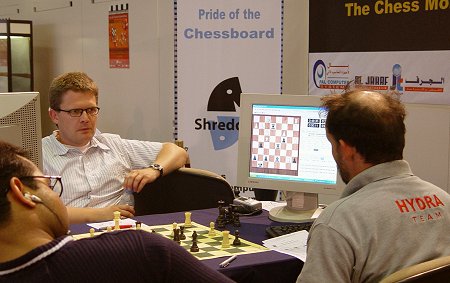
But Stefan, cool as a cucumber, has everything under control
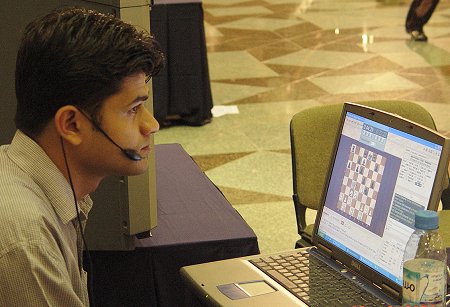
Akhtar Hashmi, who is in charge of the Playchess broadcast live
from the site

After the game the two immediately report back home on the results
Ali Nasir Mohammed on the Pal Group and chess
In the meantime we have arrived in Abu Dhabi and are firmly entrenched in the
beautiful, spacious offices of the Pal Group. Offices where people say kindhearted
things like "Internet connection? Do you have wireless? No problem, just
switch on your notebook." Where they bring you excellent coffee and switch
on Olympic coverage on a big Samsung LCD TV, to enjoy while you work. I used
the opportunity to speak to one of the chief Pal developers and Hydra project
manager, Ali Nasir Mohammed.
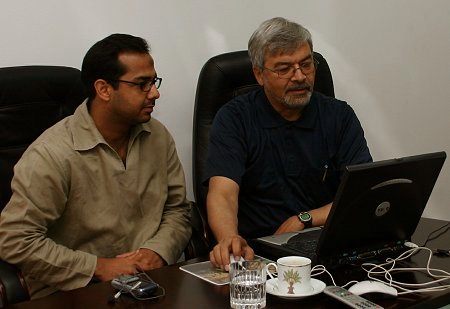
Ali Nasir and Frederic Friedel discussing Pal and computer chess in Abu
Dhabi
Frederic Friedel: Ali Nasir, thank you for your
hospitality and for all the facilities you have given me here in the Pal offices.
Tell me a little about yourself. You are originally from Pakistan?
Ali Nasir: Yes, born and bred in Karachi. I have been in Abu
Dhabi for just three years now.
Frederic: You are a programmer and a founder
of Pal?
Nasir: A computer engineer, more precisely. I studied computer
science at the University of Karachi, and not long after that I came to Abu
Dhabi and together with four colleagues we founded a company called Pal Computer
Systems. Now we have nine companies, which are together called the Pal Group
of companies. It even includes a TV station which does popular entertainment
shows.
So how did Pal become interested in computer chess?
Well, I myself was always interested in the subject. Back in Pakistan my final
research thesis was on "heuristic search algorithims in parallel environment"
as applied to the problem of chess. In Abu Dhabi our company started installing
computer clusters and naturally the question of chess quickly arose. Also this
is an area of the world where chess was originally developed, and it is still
a very popular game. If you go into a café here you will see people sitting
together playing chess and backgammon.
But this is computer chess. You won't see computers playing chess in cafés...
No, but since we are computer people it was natural for us to combine the
two areas, and to become interested in bringing this very exciting technology
to the region. I can show you our first machines if you want.
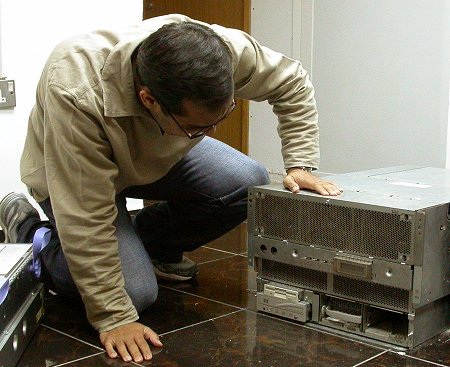
This was our very first multi-processor machine, an eight-way Xeon 700 MHz.
It is around five years old.

We can open it up and I can show you the processors if you want...

These are the individual Zenon 700 MHz modules. They were completely flat and
did not require big cooler fans.
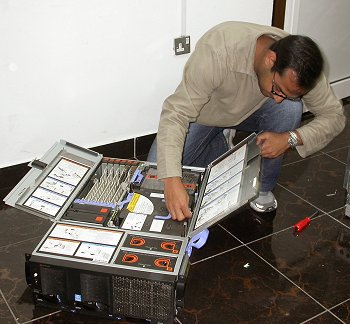
This was our second machine, which we bought last September. It's a 16-Processor
IBM machine
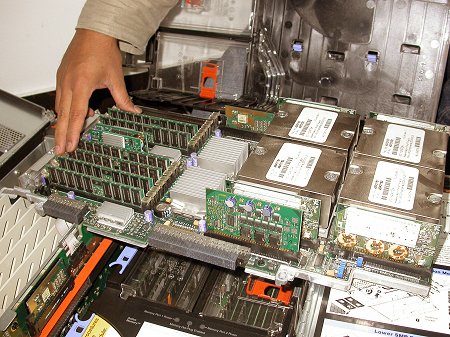
This is one four-processor unit, running at 2.8 GHz each, with 4 GMB of shared
memory
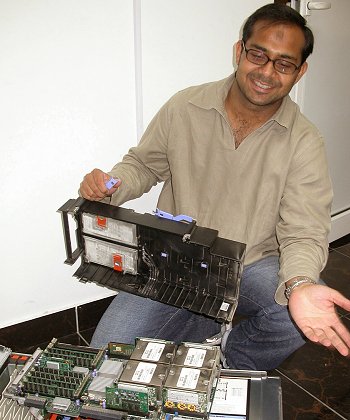
I know this system extremely well, because I had to take it apart many times
to fix things. I know it like the palm of my hand.
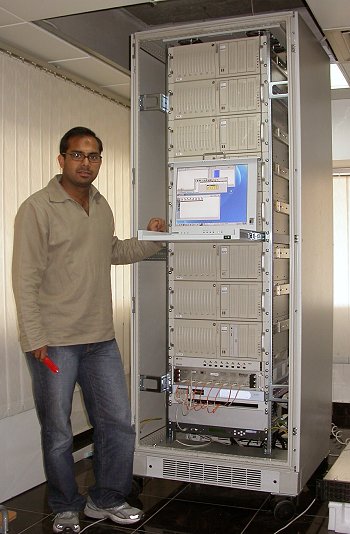
This is our latest machine, which we installed in May of this year. This is
a really powerful cluster, with 16 Xeons running at 3.06 GHz each, with about
16 GBytes of RAM in the whole system.
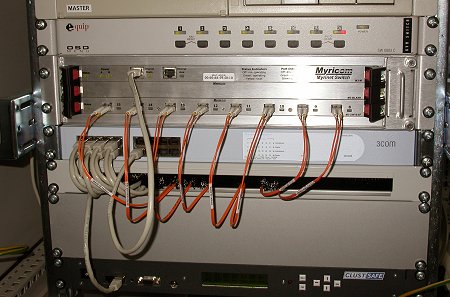
The communications between the individual processors in the cluster is done
with fibre optics, to make sure we get optimum signal speed.
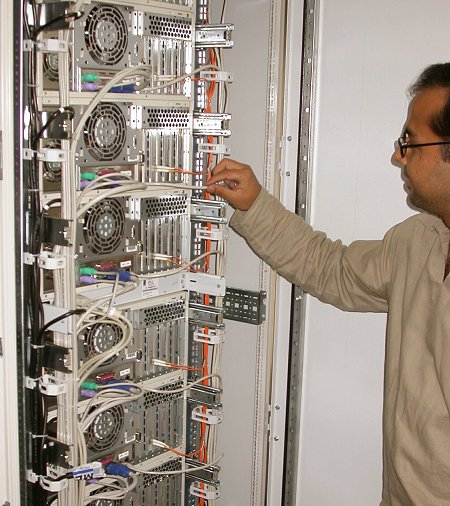
This is the back of the machine, where we installed the Hydra FPGA chips
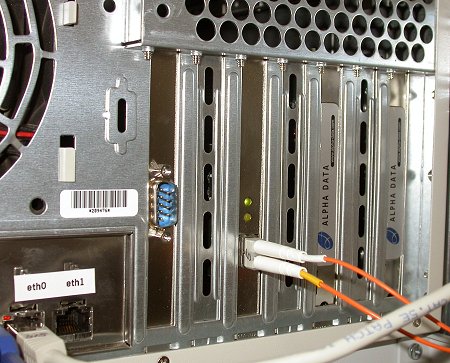
On the right you can see the two slots where the Alpha Data FPGAs are installed
Frederic: Did you buy all these machines just for chess?
Nasir: Not really, not in the beginning at least. But once
we had the machines we immediately started to experiment with chess. Most of
the top people in our company are passionately interested in the subject.
And why did you decide to use Hydra, which runs on additional hardware,
instead of one of the many SMP programs like Deep Fritz, Deep Junior or Shredder?
At the start we tested all the programs on our machines, and in fact we contacted
the programmers and offered them our facilities to test and optimise their programs.
Some of them had never had the opportunity to run on more than four processors.
We gave them remote access to our clusters and let them install their engines
and see what they could achieve. Then I went to Graz [Austria] last October
to meet the programmers and discuss a possible cooperation with them. I spent
five days there talking with Frans Morsch, Chrilly Donninger, Stefan Meyer-Kahlen,
Amir Ban, and all the others. On one of the days Brutus beat Fritz, and that
was a very interesting game, a key moment for us.
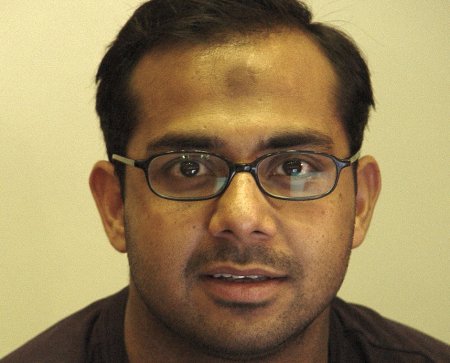
Ali Nasir Mohammed, project manager of Hydra
You based your decision on this one game?
No, but we suddenly realised that it was very interesting for us to start working
with this new technology. Our management liked the technology as well as the
playing style of Hydra. We asked them for access to their eight-processor machine
at the University of Paderborn and did some experiments. At some stage we decided
to go for it, to take over the further development of the Hydra project.
And in the end you will have what, the strongest chess playing entity on
the planet?
Hopefully yes, but we will also have gained a lot of experience in solving
this kind of problem.
What kind of problem?
The problem of running applications that require prodigious amounts of computational
resources on specialised hardware components. Essentially what you are doing
is building a very affordably super-computer. We can supply clusters with or
without the FPGA hardware enhancement.
For uses other than chess?
Surely. Currently there is a lot of interest for applications like fingerprint
and DNA matching, where a lot of computing power is required. The technology
is very close to what we are doing with Hydra – a relatively inexpensive
super-computer that is able to handle the task.
Many thanks, Ali Nasir, for this interesting tour of your world for computer
chess.







































